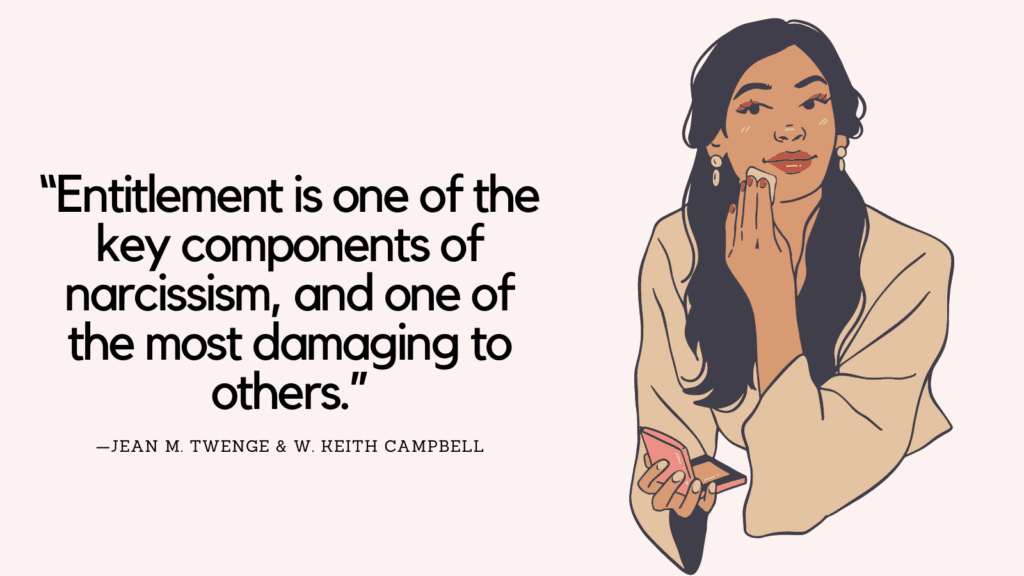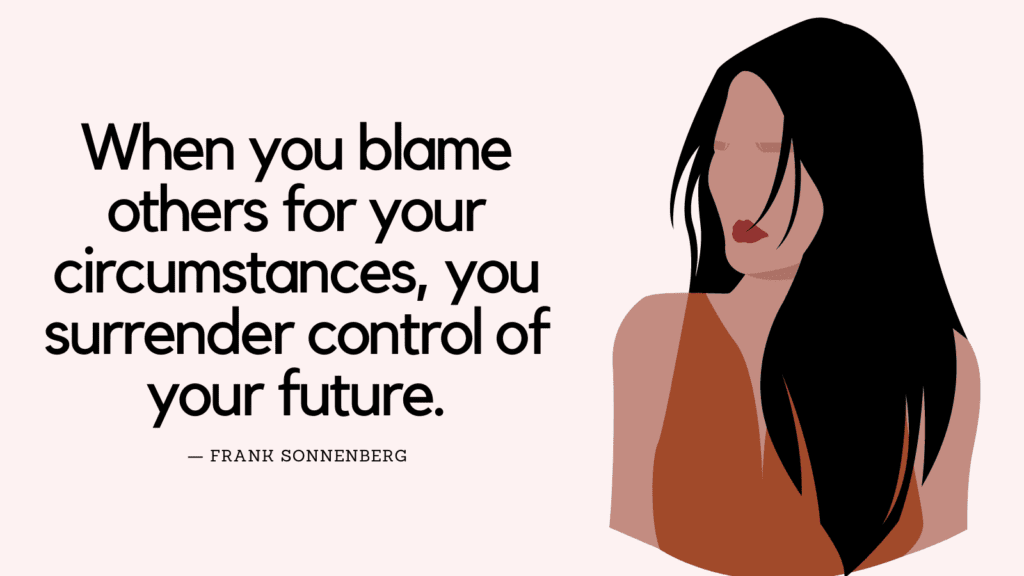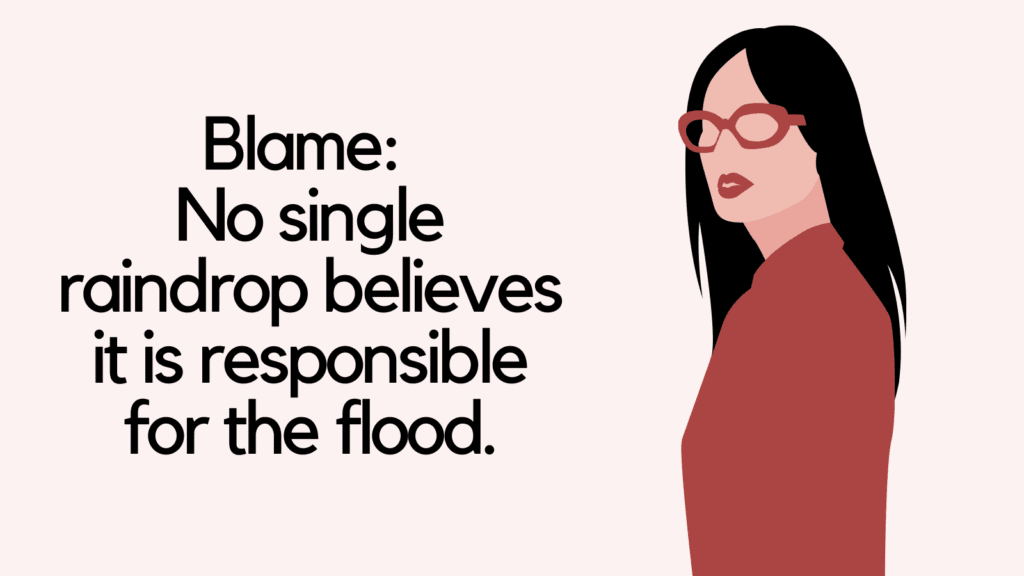This post contains some of the best don’t feel entitled quotes.
Don’t Feel Entitled Quotes
1. “Narcissism is the darker side of overly positive self-views. Narcissists are overconfident, not just confident, and are so focused on themselves they have a difficult time taking someone else’s perspective. They also feel entitled to special privileges and believe that they are superior to other people. As a result, narcissists are bad relationship partners and can be difficult to work with.”— Jean M. Twenge
2. “Many young people also display entitlement, a facet of narcissism—the belief that you deserve more than others. A scale that measures entitlement has items like “Things should go my way,” “I demand the best because I’m worth it,” and (my favorite) “If I were on the Titanic, I would deserve to be on the first lifeboat!””— Jean M. Twenge
3. “The United States was founded on several other values that are unrelated to self-admiration and even antithetical to narcissism and entitlement.”— Jean M. Twenge & W. Keith Campbell
4. “The equipment required to be cool seems to cost more and more every year. As kids get older, the demands grow larger for expensive iPods, cell phones with every feature, and front-row concert tickets. Many kids don’t earn the money to pay for such things, instead expecting they will just be given to them. This is the very definition of entitlement, one of the central facets of narcissism.”—Jean M. Twenge & W. Keith Campbell
5. “McDonald’s tells Americans “You deserve a break today,” just as entitled people agree that “people like me deserve an extra break now and then.” L’Oréal hair color tells women to buy their product “because I’m worth it,” similar to the entitlement item “I demand the best because I’m worth it.” A quick Google search shows that the entitled statement “you deserve the best” has been used to sell massages, air tours of the Grand Canyon, home loans, cell phone service, guitar lessons, moving services, health club memberships, a weight-loss supplement called “SprayFlex,” a DJ service, and even a “Life Strategist Coach” who insists that “you deserve the best life.””—Jean M. Twenge & W. Keith Campbell
Related: Is My Mother-In-Law A Narcissist Quiz
6. “Materialism is the most obvious outcome of a straightforward, practical focus on the self: you want more things for yourself. You feel entitled to get the best in life: the best clothes, the best house, the best car. You’re special; you deserve special things.”— Jean M. Twenge
7. “Many companies want to hire ambitious young employees—and they should. But managers also don’t want to be stuck with employees who are overconfident and entitled. It’s sometimes difficult to distinguish the two, especially in a brief job interview.”— Jean M. Twenge
8. “Don’t tell your kids that they are special. Tell them that you love them. This is a double guard against raising a spoiled, narcissistic child: you have emphasized emotionally close relationships instead of entitled expectations of special treatment.”—Jean M. Twenge & W. Keith Campbell
9. “Entitlement causes real problems in relationships. First, entitlement leads to conflict. Everyone at some point does or says something nasty in a relationship, and how you respond to your partner determines whether the nastiness will be a passing squall or turn into a full-blown storm. Ideally, you’ll respond in a constructive or positive way when your partner does or says something mean or stupid.”—Jean M. Twenge & W. Keith Campbell
10. “Entitled people often confuse working hard with actually producing something good.”—Jean M. Twenge & W. Keith Campbell
Related: 5 Weird Things Covert Narcissists Do To Manipulate Their Victims
11. “Many people in the United States today are simply oblivious to others’ needs, or, worse, think that others’ needs are just not as important as their own needs. This state of mind is called entitlement, the pervasive belief that one deserves special treatment, success, and more material things.”—Jean M. Twenge & W. Keith Campbell
12. “Entitlement is one of the key components of narcissism, and one of the most damaging to others.”—Jean M. Twenge & W. Keith Campbell
13. “Many GenXers feel entitled to a relationship that is always fun and easy.” – Jillian Straus
14. “Entitled people are also unwilling to see the world through another person’s eyes and find it difficult to empathize with another’s misfortunes.”—Jean M. Twenge & W. Keith Campbell
15. “Entitlement may work for some individuals—sometimes demanding students get their grades changed even when they don’t deserve it—but it has terrible consequences when everyone in a society feels a sense of entitlement”—Jean M. Twenge & W. Keith Campbell
16. “This is the trap of entitlement: it can be great to think that you are number one, but it is not so great living with or working with others who also think they are number one. Unlike some of the other symptoms of narcissism, such as materialism or vanity, entitlement is like a ghost, difficult to see in solid form, but increasingly wafting its cold, cloudy fingers into everything.”—Jean M. Twenge & W. Keith Campbell
Related: How To Overcome Entitlement Mentality? Top 3 Proven Ways To Stop Being Entitled
17. “When you are entitled, all your focus is directed toward your own experience, your own outcomes, and your own needs. This is an obvious recipe for disaster in a romantic relationship, but it doesn’t bode well for work relationships, either”—Jean M. Twenge & W. Keith Campbell
18. “Historically, entitlement meant having a social position or a claim to ownership granted by some legitimate authority. Having a title (or being entitled) meant having a clear claim to a social rank or piece of property, such as being a lord or duke in British society.”—Jean M. Twenge & W. Keith Campbell
19. “Of course, professors themselves are not immune from feelings of entitlement. The job itself probably builds narcissism; after all, several times a week, people take notes when we talk.”— Jean M. Twenge & W. Keith Campbell
20. “As a facet of narcissism, entitlement means acting as if you have a title—or a right—to something even when you don’t. There’s some overlap with the historical definition: an entitled person acts like he’s royalty and isn’t like everyone else. A student might demand a high grade as if it is his by right rather than something to be earned. A woman might purchase an expensive car on credit even though she can’t afford it because she thinks she deserves to drive a Mercedes.”—Jean M. Twenge & W. Keith Campbell
21. “Entitlement is fun while it lasts. You live in a fantasy in which the world owes you more than you contribute. You can feel entitled to a flat-screen TV without earning the money to pay for it. You can park in the handicapped space because you are in a rush. You can graduate from college and expect to get a fulfilling job with a six-figure salary right away.”—Jean M. Twenge & W. Keith Campbell
22. “Entitlement is also linked to a fundamental lack of respect for other people. The entitled person considers his needs paramount, and others’ needs minor.”—Jean M. Twenge & W. Keith Campbell
23. “Unfortunately, wanting more money for doing less work is a fairly succinct definition of entitlement.”—Jean M. Twenge & W. Keith Campbell
24. “Plenty of workers today want that, but they also want more flexibility, balance, meaning, and praise for their work. “If you just expect them to stand behind a register and smile, they’re not going to do that unless you tell them why that’s important and then recognize them for it,” says John Spano, a human resources director at a theater chain.”—Jean M. Twenge & W. Keith Campbell
Related: Top 50 Entitlement Quotes
25. “In business, entitlement often boils down to an equation: less work for more pay”—Jean M. Twenge & W. Keith Campbell
26. “In a previous era, the reward one got for coming to work on time was called “not getting fired,” and many argue that expecting praise for showing up is the definition of entitlement.”—Jean M. Twenge & W. Keith Campbell
27. “The willingness to get ahead by harming coworkers is another highly corrosive aspect of entitlement in the workplace. Narcissists often take advantage of their teammates in their attempts to succeed at all costs. These are the “glory hogs,” “suck-ups,” or “backstabbers”—people who get ahead at the expense of others and jeopardize the success of the organization.”—Jean M. Twenge & W. Keith Campbell
28. “Entitlement also has a more far-reaching and corrosive effect on society, destroying practices of reciprocity and obligation. The basic principle of reciprocity is that if someone does something for me, I need to do something for them in return.”—Jean M. Twenge & W. Keith Campbell
29. “What happens if you are dealing with someone with a large sense of entitlement? He might ask you for a favor and you comply. You are a helpful person and are happy to do so. You don’t get a thank-you, but you let that slide. Then the person asks for a favor again, and again you comply. The next week, however, you ask the person for a little favor in return and he flat out refuses. Maybe he even looks surprised that you would ask him for a favor. You get a little miffed, and the next time he asks for a favor, you decline. You are now a little less helpful in general, and less inclined to trust other people again.”—Jean M. Twenge & W. Keith Campbell
30. “This is a major problem with entitlement: entitled people don’t see reciprocity as a twoway street, they see favors as a one-way on-ramp that leads to them. The result is that the whole concept of reciprocity gets diminished and life gets a little harder and more isolated for everyone. Reciprocity is the glue that binds society together, and entitlement dissolves that glue.”—Jean M. Twenge & W. Keith Campbell
Related: Overcoming Envy: How To Stop Feeling Envious Of Others’ Success?




